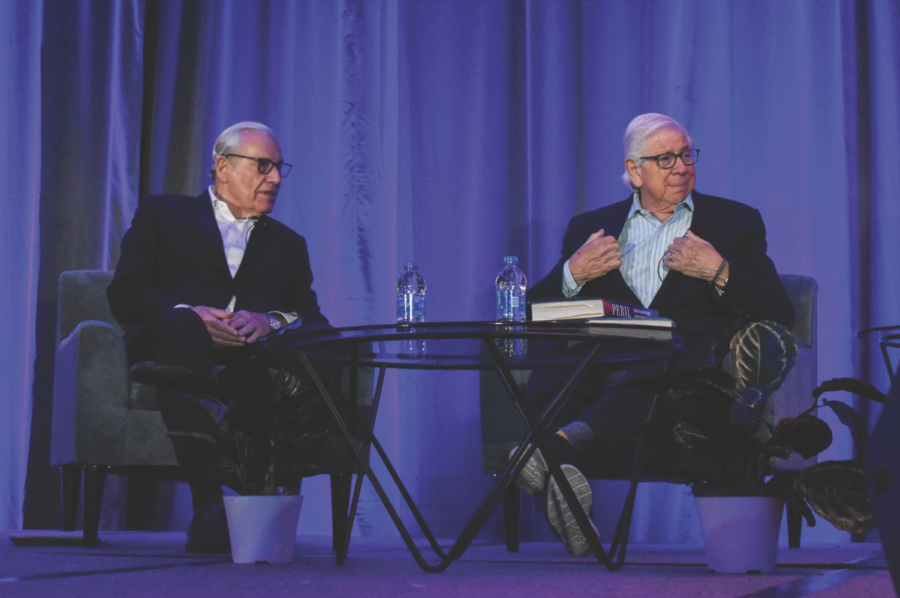‘A lot of work to do.’ Bob Woodward and Carl Bernstein offer perspectives on journalism today
Journalists and authors Bob Woodward (left) and Carl Bernstein speak to a crowd at MediaFest22 on Friday, Oct. 28, 2022, at the Grand Hyatt Washington in Washington, D.C. Photo by Abbey Cutrer | Staff
November 4, 2022
Bob Woodward was asleep when he got the call from his Washington Post editor.
There had been a break-in overnight at the Democratic National Headquarters, and Woodward, who had been working at the Post for nine months, was sent to the courthouse to cover the hearing.
“June 17, 1972, was one of the most beautiful days in Washington, ever, and so the editors sat around and said, ‘Who would be dumb enough to come in and work today?’ And they immediately thought of me,” he said.
On Oct. 28, Woodward and his long-time shared byline, Carl Bernstein, spoke to a throng of student journalists, advisers and professionals in the media industry. The two were keynote speakers as part of MediaFest22, a convention in Washington, D.C., bringing together journalists from across the country.
The discussion, moderated by Society of Professional Journalists President Claire Regan, covered topics ranging from Watergate to Woodward and Bernstein’s more recent projects.
The journalists described uncovering and breaking the Watergate story, offering a unique insider view of the process. When they started to piece together that the bigger story extended beyond just an isolated break-in, Woodward said that he and Bernstein decided to “start from the bottom” rather than going directly to those at the top.
“These people are not going to talk to us,” he said. “We can’t go to the Nixon campaign. We can’t go to the White House. So we’ve got to knock on the doors, and this was the Bernstein method, which I think everyone still uses.”
Evidently, another part of the Bernstein method is to have exes in high places; he and Woodward obtained a list of employees on the Nixon campaign from one of Bernstein’s old girlfriends.
One of the people on that list was a bookkeeper whom Bernstein went to visit in hopes that she would have information to share.
“It became clear early on that the bookkeeper was intimidated and scared to talk, and yet she wanted to,” he said. “People want to tell the truth.”
Meanwhile, Woodward was working with his anonymous informant, known at the time as Deep Throat, who turned out to be former FBI Associate Director Mark Felt. Together, Woodward and Bernstein uncovered more and more of the scandal, publishing more than 200 stories related to Watergate in the span of a year and a half.
Woodward said that it was this collaboration that allowed the duo to be so successful in their reporting.
“If I have one criticism of current journalism, there’s not enough collaboration. People work alone or in a team of five,” he said. “A team of two is really ideal, particularly when you have different backgrounds and there’s an element of competition, and quite frankly, for a while, it’s distrust.”
Once the story had broken and Richard Nixon resigned from office, Woodward and Bernstein received a letter from legendary Post publisher Katharine Graham cautioning them to “beware the demon pomposity,” advice that Woodward said rings true even today, in “this world of self-congratulation,” as he described it.
Regan steered the conversation toward the journalists’ more recent projects, referencing their comparison of former president Donald Trump to Nixon.
“Woodward and I came to use the term while we were covering Watergate, ‘the best obtainable version of the truth,’” Bernstein said. “And I think one of the amazing things that’s happened and will continue to happen, given what we know about Donald Trump, is how what is truthful is so spectacular in its mendacity, in terms of its assumptions, that there are no rules, there are no restraints, there is no untruth that will not be told.”
Woodward said that both Watergate and the Jan. 6 attack were directly targeting the democratic system America was founded on.
“It was breathtaking, what we now know Nixon and his people did. They destroyed the process of nominating and electing a president,” he said. “So we better think hard about the vulnerability of that system and the system that the Jan. 6 Committee has exposed … and so for everyone here, there is a lot of work to do.”


































































































































































Ronald Braun • Nov 7, 2022 at 10:48 am
Agreed, especially Ms. Graham’s advice. The right and left media outlets are ripe with people who’s pomposity overshadows the facts. I think it has always been this way since Hamilton, Franklin,Winchell,etc. The difference today is the broadness and speed with which near truths or outright lies can be comported. Journalism student would do well to include the work of journalist’s like Lippman , Cronkite, and don’t forget Nellie Bly , and of course you two.